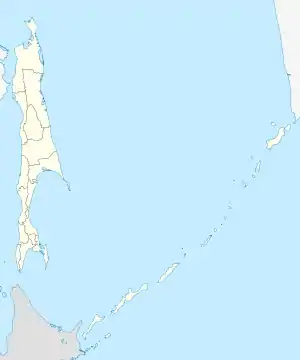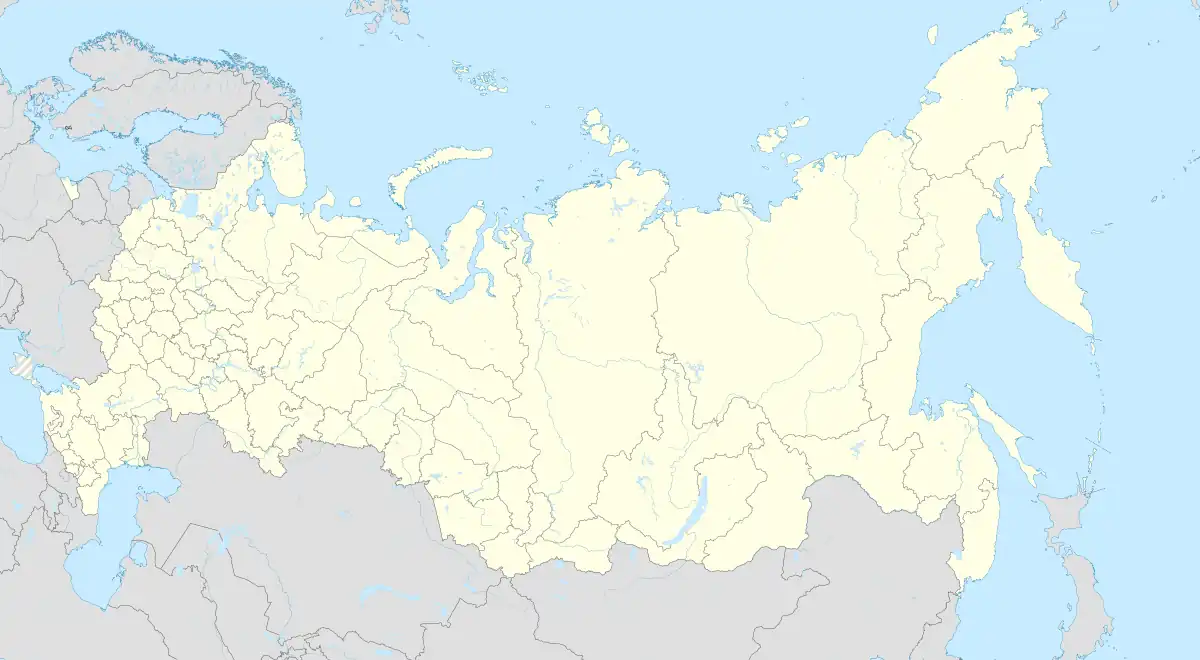| Smirnykh Kiton  | |||||||
|---|---|---|---|---|---|---|---|
| Smirnykh, Sakhalin Oblast in Russia | |||||||
 Smirnykh Shown within Sakhalin Oblast  Smirnykh Smirnykh (Russia) | |||||||
| Coordinates | 49°44′18″N 142°51′36″E / 49.73833°N 142.86000°E | ||||||
| Type | Air Base | ||||||
| Site information | |||||||
| Owner | Ministry of Defence | ||||||
| Operator | Russian Air Force | ||||||
| Site history | |||||||
| In use | 1945 - 1994 | ||||||
| Airfield information | |||||||
| Elevation | 43 metres (141 ft) AMSL | ||||||
| |||||||
Smirnykh (Russian: Смирных) is an abandoned Russian Air Force airbase in Sakhalin, Russia located 2 km east of the village of the same name. It appeared in June 1966 KH-7 imagery with a runway length of 2,000 m. It was expanded sometime after this to 2,500 m with a new extension of revetments added.
History
The base was originally built near the town of Smirnykh, a coaling and watering station for the Sakhalin railway. The airfield was built by the Imperial Japanese Army in the early 20th century and was called Keton. After the Second World War, Southern Sakhalin was handed over to the Soviet Union, and the airbase was then expanded. The airfield was first detected by Western intelligence around 1962. By 1965 19 Yakovlev Yak-28P (ASCC: Firebar) were known to be stationed at the airfield.[1]
In October 1972 a US reconnaissance satellite assessment showed 17 Yak-28P long-range interceptors, 2 Antonov An-24 (ASCC: Coke) transports, and 1 Lisunov Li-2 (ASCC: Cab) (DC-3 copy) transport.[2]
By the 1980s Smirnykh was home to a Mikoyan-Gurevich MiG-23 (ASCC: Flogger-G) interceptor regiment[3] An ICAO report on the 1983 downing of Korean Air Lines Flight 007 indicated Soviet Air Defence Forces (PVO) MiG-23 fighter aircraft from Smirnykh were scrambled, but it was an Sukhoi Su-15 (ASCC: Flagon) jet from Dolinsk-Sokol which carried out the shootdown.
The airfield is no longer in use and the runways have not been maintained in decades.
The base was used by the:
- 132nd Heavy Bomber Aviation Regiment between 1945 and 1951 with the Tupolev Tu-2 (ASCC: Bat)[4]
- 301st Fighter Aviation Regiment during 1972 with the Sukhoi Su-9 (ASCC: Fishpot)[5]
- 454th Bomber Aviation Regiment between 1945 and 1951 with the Tu-2[6]
- 528th Fighter Aviation Regiment between 1945 and 1994[7]
References
- ↑ 196507_MISSION COVERAGE INDEX MISSION 4017 29 APRIL - 3 MAY 1965, CIA-RDP03T02227R000100070002-8, Central Intelligence Agency, Washington, DC.
- ↑ OAK SUPPLEMENT PART 8 KH-9 MISSION 1204 11 OCTOBER - 17 DECEMBER 1972 (TOP SECRET), CIA-RDP78T04752A000100010005-1, Central Intelligence Agency, January 1, 1973.
- ↑ Fencer Deployment, Smirnykh Airfield, USSR, Central Intelligence Agency, October 1983.
- ↑ "132nd Berlinskiy orders of Kutuzov and Aleksandr Nevskiy Heavy Bomber Aviation Regiment". Soviet Armed Forces 1945-1991. Retrieved 4 January 2023.
- ↑ "301st Fighter Aviation Regiment PVO". Soviet Armed Forces 1945-1991. Retrieved 4 January 2023.
- ↑ "454th Bomber Aviation Regiment". Soviet Armed Forces 1945-1991. Retrieved 4 January 2023.
- ↑ "528th Fighter Aviation Regiment PVO". Soviet Armed Forces 1945-1991. Retrieved 4 January 2023.